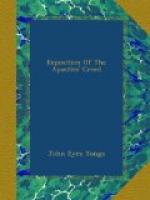(a) The view of those who hold that all phenomena and all existence originate in Chance or a blind fortuitous concourse of atoms. To state such a doctrine is to refute it. No one possessed of reason can believe in his heart that Intelligence did not create and organise matter, or that the material universe, with all its adaptation of parts, was evolved, and is governed, by chance or accident. This theory, if it is worthy of the name, seems to have been devised in order to evade the idea that man is subject to Divine government.
(b) Another view is that all existence owes its origin to Fate or Necessity and is now held in its resistless grasp. The advocates of this theory are at variance among themselves. One school maintains that all things existed from eternity in their present condition, and are destined to continue as they are, controlled by relentless and undeviating necessity. Another school—the ancient Fatalists—held that at first there was a fortuitous concourse of atoms and phenomena, until Fate or Chance decided the present order, which became an established necessity. A third class hold doctrines of Development. Some of them agree with the ancient Fatalists in maintaining that development, in a fortuitous concourse and action of matter and force, issued in evolution or originated a course of evolution. Others again deny fortuitous concourse and affirm that this process of evolution had no external beginning, but has continued from eternity under the control of evolutionary law. The term “law” as used by them has no specific meaning, and is simply an adaptation, to a theory naturally atheistic, of a word which may serve to commend their doctrine. The “law” of which they speak has its origin in matter itself, and is not under the control of a Supreme Intelligence. That this is the fact is shown by the denial of free-will in man and of the superintending providence of God; of the efficacy of prayer and of the forgiveness of sin; and by the prominence given in their writings to the absolute control of all things by undeviating, unchanging law.
(c) A third view affirms that while there is a distinction between the Ego and the non-Ego (the me and the not-me), it is impossible to know anything about either in its essence. That they exist and that they are different are facts within our knowledge, but as to the absolute nature of mind and matter we can discover and believe nothing. The ultimate or absolute is beyond our reach, as is the infinite and unconditioned. We can have no knowledge of First Causes, or of the Ultimate Cause, or of the Absolute Cause. The infinite cannot even be apprehended, and those who undertake to learn or to speculate regarding the infinite engage in a task beyond their powers. Such knowledge is not practical. The term “God” is merely an expression for a mode of the unknowable, conveying no meaning to those who use it. The view thus expressed originated




